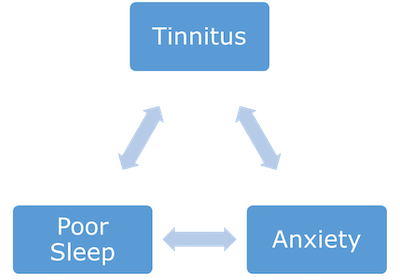How common is poor quality sleep?
Now everyone will have occasional nights when they struggle getting to sleep or wake up feeling as if they have been awake most of the night. But if you have tinnitus your chances of suffering from poor sleep are much higher.
When we talk to members of Tinnitus Tunes about a third list “poor sleep quality” as their major challenge and according to the British Tinnitus Association up to 70% of people attending their tinnitus clinics suffer from sleeping difficulties.
So, you are not alone, but that is probably not a great comfort. That is why we have developed a Free Tinnitus Sleep Guide to give you:
- 7 simple action steps you can take yourself to fall asleep faster, stay asleep and wake up refreshed instead of exhausted.
- A breakthrough to tackle and change your tinnitus (empower you to hit the cause as well as the symptoms).
- How to attack another potential underlying cause of your sleep difficulties and show you how to move to a new “calmer future”.
- Access to ongoing support and information sources.
 What is the link between Tinnitus & Sleep difficulties?
What is the link between Tinnitus & Sleep difficulties?
I am sure I don’t have to tell you the first obvious link – those damned tinnitus noises!
You naturally tend to be more aware of your tinnitus when you slow down and are in a quiet environment. Just as you are settling down to sleep your tinnitus noises can interfere and stop you from moving into that peaceful, drowsy and relaxed state halfway between being awake and sleeping.
The sleep scientists talk about 5 stages of sleep and for stage 1 to be effective (so you drift off to sleep quickly), the body should become more relaxed with muscle tension reducing along with your body temperature, your heart rate and breathing slows down and your brain waves also slow down to a pattern known as theta.
Three other deadly tinnitus connections that may keep you awake
Number 1 – Tinnitus and your hyper-active brain
We all have nights where it seems like our brain is working over-time rehashing some tough conversation we had during the day, or when we are trying to make some big decision.
Brain research is showing that if you have tinnitus your brain is not just always switched on – it is Full ON, or as the research scientists describe it “tinnitus and the over-active brain”. A summary of the research was published in Science Daily on August 25th, 2017. The work by University of Illinois researchers using MRI scans found that chronic tinnitus is associated with changes in certain networks in the brain (a region called the precuneus) that causes the brain to stay more at attention and less at rest – not a good state for sleep.
Number 2 – Tinnitus and Anxiety
You may well be stuck in a vicious cycle where one of the symptoms from your Tinnitus is high levels of Anxiety which then makes it difficult to Sleep, and the lack of Sleep makes both your Tinnitus and Anxiety worse and so it goes on.
In the Tinnitus Tunes sleep guide, we address ways to break that vicious cycle.
Number 3 – Taking a pill can make your tinnitus worse
Although almost everyone knows long term use of sleeping pills is bad, a huge number of people rely on medication to help them sleep.
Just to be clear, I am not saying you should point blank refuse to take any medication prescribed by your doctor to help with anxiety or sleep (at least for a short period of time).
You will see later there are better ways of tackling your Anxiety, Sleep and Tinnitus challenges without taking drugs.
We also warn our Tinnitus Tunes members that some of the pills prescribed to help sleep, depression, anxiety and tinnitus can have a side effect of triggering tinnitus, or if you already have tinnitus making it worse. So, if you already have tinnitus, make sure to discuss the potential side effects of any medication with both your doctor and your pharmacist.